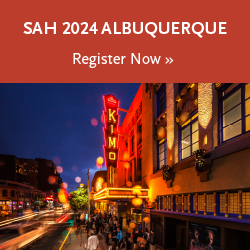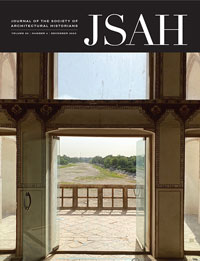-
Membership
Membership
Anyone with an interest in the history of the built environment is welcome to join the Society of Architectural Historians -
Conferences
Conferences
SAH Annual International Conferences bring members together for scholarly exchange and networking -
Publications
Publications
Through print and digital publications, SAH documents the history of the built environment and disseminates scholarship -
Programs
Programs
SAH promotes meaningful engagement with the history of the built environment through its programsMember Programs
-
Jobs & Opportunities
Jobs & Opportunities
SAH provides resources, fellowships, and grants to help further your career and professional life -
Support
Support
We invite you to support the educational mission of SAH by making a gift, becoming a member, or volunteering -
About
About
SAH promotes the study, interpretation, and conservation of the built environment worldwide for the benefit of all
Call for Proposals – JSAH Roundtable: Rethinking the Urban Landscape
Jul 30, 2021
by
SAH News

An enduring intellectual and a perceptual rift divides the city from the natural world both in scholarship as well as in the public imagination. In the past three decades, humanities scholars working with social and natural scientists have challenged these assumptions by investigating the complex interaction and intersection of cultural and natural systems, and by exploring how cities and nature are inextricably woven together into what is being called the urban landscape. Just as the seminal work of urban historians such as William Cronon and Ari Kelman and the studies of environmental humanists such as Ursula Heise and Alison Carruth have advanced our understanding of the integration of the built and natural worlds, a range of pathbreaking scholarship—for example, Linda Nash on histories of disease and the environment, Laura Pulido on race and architecture, Matthew Gandy on urban waters, and Kim Stanley Robinson on the imagined cities of science fiction—draws new attention to the symbiotic relationship between cities and nature while also broadening and transforming our understanding of these categories. Most recently, historians such as Carolyn Finney, Dorceta Taylor, Alaina E. Roberts, and Lauret Savoy have made critical contributions to the discourse by examining how ideas of race, nature, and the built environment intersect in complex, ambiguous, and often concealed ways. The shift that we are now witnessing in the framing of humanities scholarship on cities and nature offers a vital opportunity for us to develop a broader and more inclusive approach to the ways that we teach and study architectural, landscape, and urban histories as well as urban and environmental studies.
Seeking to promote a more complex understanding of how scholars conceptualize cities and nature, more specifically in the context of questions of democracy, race, and identity, and to expand opportunities for collaborative thinking across the humanities and sciences, this JSAH roundtable invites our contributors to consider three broad questions. First, in what ways and to what ends have scholars reframed how the city/nature duality is read and understood? Second, how has interdisciplinary scholarship across the humanities and natural sciences challenged and shaped research and teaching on cities and nature? Third, how can humanists push the boundaries of scholarship and teaching further to understand the implications of an increasingly urban world? Or to quote Allison Carruth, how might we best “articulate the public engagements of the environmental humanities itself, that is to consider both the potentials and pitfalls for what we might call a scholarly social practice”?
Submission Guidelines
A JSAH roundtable consists of a series of short essays, each of approximately 1000 words, that will be collectively published in the place of a single article in an issue of JSAH. This format provides an opportunity for a range of scholars to explore new research directions through a variety of lenses, alongside the traditional full-length articles that are the JSAH mainstay. We welcome submissions by scholars at different career stages (including independent scholars) and different types of institutions (universities, government agencies, museums) that are diverse in their gender, racial, and national composition. Scholars are invited to submit a CV and a one-paragraph proposal for consideration to Thaisa Way, wayt01@doaks.org, and David Karmon, dkarmon@holycross.edu.
Deadline for submissions: 15 October 2021


